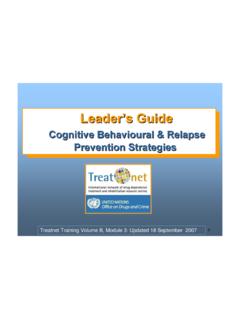Transcription of Keynote address delivered at the European Congress of ...
1 Copyright 1993 Christine A. Padesky, PhD All rights reserved Keynote address delivered at the European Congress of Behavioural and cognitive Therapies, London, September 24, 1993 Socratic questioning :Changing Minds or Guiding Discovery?Christine A. Padesky, for cognitive therapy , Huntington Beach, California Why did you choose to come and hear this talk?What am I going to say?What do you already know about Socraticquestioning?Don't you think it is a mistake to ask questions withouta goal in mind?These are all questions. Are they equally usefulquestions? I don't think so. When I first began doingcognitive therapy fifteen years ago, I thought theSocratic questioning process was the most intriguingpart of the therapy . I still do. Today you will hear thebest questions I've been asked about Socraticquestioning and the paths I've followed to will assert that some questions are better thanothers, that it is possible to develop guidelines to helptherapists and clients learn to use Socratic questionsmore effectively, and that it is important we answerthe question, "Is the primary purpose of Socraticquestioning to change minds or to guide discovery?
2 "My thinking for this talk actually began in 1986. Bythen I had attained sufficient skill as a cognitivetherapist that therapists began asking me, "How doyou know what questions to ask?" Somehow,responding that the questions just intuitively "poppedinto my head" did not seem a satisfactory yet, for me and, I suspect, for many other skilledtherapists, it was hard to articulate how I thought ofthe questions I question posed to me seven years ago, "Howdo you know what questions to ask?" has guided myown learning as a therapist and teacher of CognitiveTherapy more than any other. It is a tribute to thepower of a well-timed question that I have beenstimulated by this simple query to engage in extensiveobservation of myself and other therapists for sevenyears in search of a satisfactory course, therapists studying cognitive therapywith me continued to pose the question.
3 For awhile, Ianswered my students' curiosity by providing lists ofquestions that could be asked in therapy . Then wewould develop rationales in our training programs forwhy one question would be better to ask first andanother later and yet another not asked at all. Thiscollaborative process between us led to thedevelopment of a list of good Socratic questions thatwere generic in nature and generally led the client todiscovering useful information. Typical Socraticquestions on the "good" list included:Have you ever been in similar circumstances before?What did you do? How did that turn out?What do you know now that you didn't know then?What would you advise a friend who told yousomething similar?This strategy of listing good questions to ask was auseful one. I discovered that it was not only helpful totherapists learning cognitive therapy , but I begangiving these questions to clients and found that thesesame questions helped clients generate alternativeresponses on their written automatic thought , as I became more aware of what questions Itended to ask again and again, this knowledge couldbe shared with other therapists and the question asked in 1986 continued to rollaround in my mind.
4 "How do I know what questions toask?" Although beginning students of CognitiveTherapy were quite satisfied with my list of "goodquestions to ask," more advanced therapists werequite aware that these generic questions were notenough. I didn't simply ask these questions over andover again. I asked hundreds of different questionsand different questions with each client. Where didthese questions come from? And was there anypattern to the questions I asked when I was doingtherapy well?Approximately 100,000 therapeutic questions later, Ihave discovered some patterns in my own myself and other experienced cognitivetherapists on videotape, I think these simple patternsmight serve as a beginning to a clearer articulation ofwhat is involved in good Socratic questioning within acognitive therapy context.
5 Therefore, I will offerguidelines tonight for therapists who wish to improvetheir Socratic questioning before doing that, I'm going to digress todiscuss the purpose of Socratic questioning . I beganthinking about this in 1990 when a therapist wrote meafter a large workshop and asked for writtenreferences on Socratic questioning . In particular, hewanted some written descriptions of how Socraticquestioning was defined in cognitive therapy andsome examples and guidelines of how to do it. I quickly turned to my library of cognitive Therapybooks to find some references on SocraticSocratic questioning - PadeskyPage 2 Copyright 1993 Christine A. Padesky, PhD All rights reserved questioning so I could respond to his letter. I beganwith cognitive therapy of Depression and proceededthrough books published in 1990.
6 To my surprise,there was almost nothing written on Socraticquestioning. There were hundreds of references tothis questioning process as a cornerstone of cognitivetherapy, but little had been written describing ordefining the process. Others, including Tim Beck, Melanie Fennell, andGary Emery had also come up with "good questions"lists like we had devised but no one described theprocess in great detail. In fact the two articles writtenby Overholser and published in the 1993 spring issueof Psychotherapy are the first papers I've read writtenspecifically on the Socratic back to 1990. Next, I turned to the clinicalvignettes in these books. I thought, "Well, I'll send himvignettes from several different books and the processwill at least be clearly illustrated." To my chagrin, Idiscovered that many of the published vignettes didnot seem to illustrate what I considered good Socraticquestioning.
7 Clearly I had some notion of the purpose andprocess of Socratic questioning which was beingviolated in these vignettes. I suddenly wanted todefine standards that could be used to judge "Socraticquestioning" as "good". Furthermore, I realized for thefirst time that not all cognitive Therapists were inagreement on what constituted good I read therapy vignettes in various CognitiveTherapy texts, I noticed they varied considerably intherapist style. In some examples, the therapistseemed to know exactly where he or she was these examples, the therapist would ask a series offactual questions "one-two-three" and then say to theclient (almost triumphantly) "well, then how can youthink thus and so?" The client in these vignettes wouldinvariably say, "Oh, I see what you mean." In these clinical examples, the client would report achange in mind, but I felt disappointed in thetherapeutic process.
8 Perhaps my disappointment wasfueled by my clinical experience in which few clientsundergo lasting change because a therapist hasshown their thought processes to be illogical. And yetthere are many clinical vignettes in the literature thatimply cognitive therapy consists primarily of atherapist and client revealing logical flaws in theclient's thought process: One-two-three-aha! Theoretically, I can't accept that the goal of Socraticquestioning is to change client's beliefs. Why not?Isn't change in beliefs one of the primary goals ofcognitive therapy . and no. While changingbeliefs is often very therapeutic, I worry about thetherapeutic costs if belief change by any means is thegoal. Our theoretical underpinnings in cognitivetherapy are that we are to be collaboratively a therapist who sees a flaw in a client's thoughtprocess and sets out to change the client's mind becollaborative and empirical?
9 Yes, but often we are me give you two clinical vignettes of my own whichillustrate the difference between changing minds andguiding discovery. In these vignettes, a depressedclient named Stuart (S) believes he is a failure inevery way. I will be the therapist in both 1: Changing Stuart's MindS: I'm a complete failure in every : You look defeated when you say that. Do youfeel defeated?S: Yes. I'm no : You say you are no good. Is it true that youhaven't done anything at all good?S:Nothing of : How about for your children this week -- did youcare for them at all?S:Of course, I helped my wife put them to bed andtook them to soccer : Do you think that was important to them?S: I suppose : And did you do anything to make your wifehappy this week?S: She liked the fact that I came home from workon : Would a "complete failure" be able to respond tohis wife's request in such a successful way?
10 S: I guess : So is it really accurate to say you are a completefailure in every way? S: I suppose not. Th: So how do you feel now? S: I guess a little this example, I am trying to show a relativelygood example of questioning to change a client'smind. This is not bad therapy . The therapist engagesin a reasonable line of questioning and it seemssomewhat helpful to the , I believe we can do better. And I believemany therapists would do better if we had betterdescriptions of the Socratic questioning this first example, with the followingexample of Socratic questioning where the purpose isnot to change the client's mind, but to guide questioning - PadeskyPage 3 Copyright 1993 Christine A. Padesky, PhD All rights reserved Example 2: Guiding DiscoveryS: I'm a complete failure in every : You look defeated when you say that.








